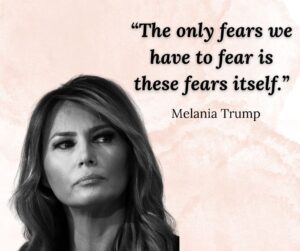Fear is one of the most profound and universal human emotions. It shapes our decisions, molds our perspectives, and can either propel us toward greatness or hold us back from fulfilling our potential. Former First Lady Melania Trump’s statement, “The only fears we have to fear is these fears itself,” presents an intriguing perspective on the nature of fear. While reminiscent of Franklin D. Roosevelt’s famous quote, it adds a layered interpretation that challenges us to reflect on the fears we create and perpetuate.
This article delves into the essence of Melania Trump’s message, exploring the concept of fear, its impact on our lives, and how we can transform it into a tool for growth and empowerment.
Understanding Fear
At its core, fear is a survival mechanism, hardwired into our biology. It alerts us to potential danger and readies our body to react through the fight-or-flight response. However, not all fears are rooted in immediate threats. Many fears are psychological, stemming from imagined scenarios, past traumas, or societal influences.
Melania Trump’s statement invites us to confront these constructed fears—those that exist primarily in our minds. These “fears of fears” are self-perpetuating cycles of anxiety. For example:
- Fear of Failure: We often fear failing so much that we never take the first step toward our dreams.
- Fear of Judgment: Worrying about others’ opinions can paralyze our authenticity and self-expression.
- Fear of the Unknown: Our discomfort with uncertainty can prevent us from embracing new opportunities.
Recognizing these fears as self-imposed barriers is the first step toward dismantling them.
How Fear Becomes Self-Perpetuating
Melania’s phrasing emphasizes that we often fear the concept of fear itself. This phenomenon, known as meta-fear, occurs when we dread the emotional or physical sensations associated with fear, such as a racing heart, shaky hands, or intrusive thoughts.
For instance:
- A public speaker might not fear the act of speaking but the anxiety leading up to it.
- Someone avoiding a difficult conversation might fear the discomfort of confrontation more than the outcome itself.
This cyclical relationship with fear can trap us in a pattern of avoidance, ultimately amplifying the very emotions we wish to escape.
Breaking Free from the Fear Cycle
If fear is inevitable, the goal isn’t to eliminate it but to transform our relationship with it. Here are strategies to help us embrace and conquer fear:
- Reframe Fear as a Teacher
Fear often points us toward areas of growth. Instead of viewing fear as a barrier, ask what it’s trying to teach you. For example:
- Fear of failure might highlight the need for better preparation.
- Fear of the unknown could signal a desire for clarity or security.
By seeing fear as a guide, you shift from avoidance to curiosity.
- Practice Mindfulness
Mindfulness techniques, such as meditation and deep breathing, can help us observe our fears without judgment. By creating space between ourselves and our emotions, we reduce fear’s power to overwhelm us.
- Take Small, Courageous Steps
Overcoming fear doesn’t require grand gestures. Small, consistent actions can build confidence and resilience. For instance:
- Afraid of public speaking? Start by sharing your thoughts in small group discussions.
- Hesitant to try something new? Experiment with low-risk opportunities.
Each step forward diminishes fear’s hold over time.
- Seek Support
Talking about your fears with trusted friends, family, or mentors can provide perspective and reassurance. Sometimes, simply voicing your fears aloud can make them feel less daunting.
- Embrace the Discomfort
Growth often requires stepping outside your comfort zone. By willingly facing discomfort, you train your mind to see fear as a temporary state rather than an insurmountable obstacle.
The Role of Courage
Melania Trump’s message highlights the need for courage in addressing fear. Courage isn’t the absence of fear but the willingness to act despite it. Some of history’s greatest achievements emerged from moments of profound fear, met with equally profound bravery.
Consider figures like Rosa Parks, who faced fear with quiet resolve, or astronauts who ventured into space despite the risks. Their courage didn’t eliminate fear but transformed it into a force for progress.
In our everyday lives, courage might look like:
- Starting a new career despite uncertainty.
- Having an honest conversation about your feelings.
- Pursuing a passion others might not understand.
Every act of courage chips away at the fears holding us back.
The Ripple Effect of Facing Fears
When we confront and conquer our fears, the benefits extend beyond our personal lives. Fear is often contagious—when one person succumbs to it, it can spread through families, communities, and even societies. Conversely, courage is equally contagious. By overcoming our fears, we inspire others to do the same.
For example:
- A leader who navigates challenges with calm determination can reassure their team.
- A parent who faces their fears teaches their children resilience and strength.
Melania Trump’s words remind us that breaking free from fear’s grip isn’t just a personal victory—it’s a collective one.
The Spiritual Perspective on Fear
From a spiritual standpoint, fear can disconnect us from our higher selves and divine purpose. Many spiritual teachings emphasize that fear stems from a lack of trust—whether in ourselves, others, or a higher power.
By cultivating faith and inner peace, we can rise above fear’s limitations. Practices such as prayer, meditation, and gratitude help us align with love and light, replacing fear with hope and confidence.
Inspiring Message: The Power of Hope
Melania Trump’s statement serves as a reminder that fear is often an illusion. By confronting it, we awaken to our true potential. Let her message inspire you to:
- Acknowledge your fears without judgment.
- Take deliberate steps to overcome them.
- Use fear as a stepping stone toward growth.
Remember, the only fears you truly need to fear are the ones you allow to control you. By shifting your mindset, you can transform fear into a catalyst for courage, strength, and transformation.
Conclusion
Melania Trump’s insight, “The only fears we have to fear is these fears itself,” encapsulates the paradox of fear—it is both a natural part of the human experience and a construct of our imagination. Her words encourage us to challenge the fears that hold us back and recognize that, often, the fear of fear itself is our greatest obstacle.
In a world where uncertainty is inevitable, let us choose courage over hesitation and faith over doubt. For in doing so, we not only conquer our fears but unlock the boundless potential within us all.


















